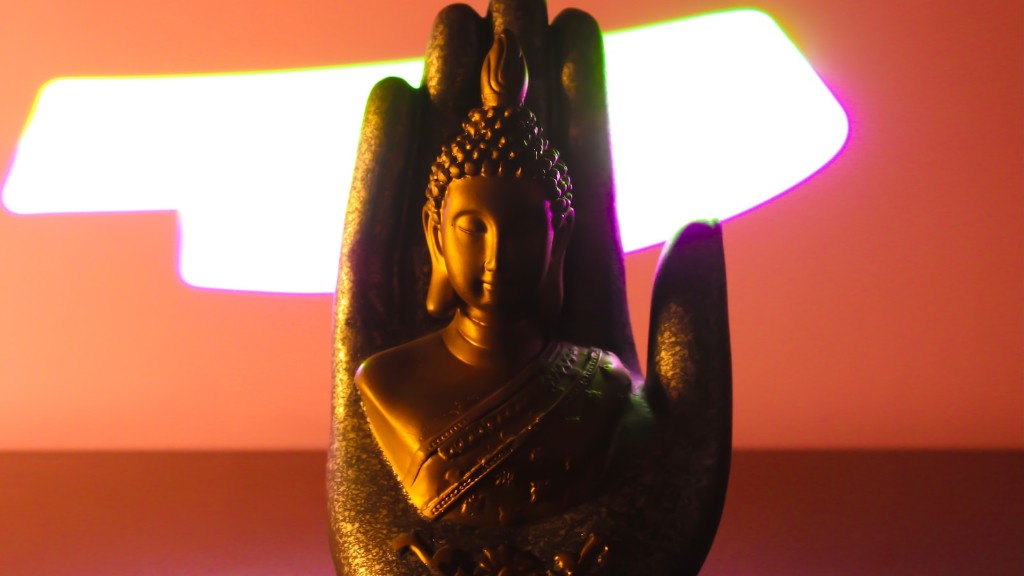Nature and Characteristics of the Deity
Christianity is an Abrahamic religion, with an emphasis on one God, monotheism. Its followers, known as Christians, believe that the deity of this religion is the one and only true God, the creator and ruler of everything that exists. Most Christians associate the deity of the religion with the Father, the Son and the Holy Spirit, working together in a trinity.
The Father is the source of all things, the Son is God incarnate and the Holy Spirit is the power that binds the two together. This trinity is often referred to as the Godhead, a term used to describe the essences of the Father, Son and Holy Spirit. From this Godhead, Christians believe that all other divine beings, including angels, derive their power.
Traditionally, Christians view the deity as a transcendent being; an omniscient, omnipotent and omnipresent God. This means that the deity is outside of the realm of the physical universe, transcending all time and space. As an all-knowing being, the deity is believed to have perfect knowledge of the past, present and future. As an all-powerful being, the deity can create or control anything that exists, including energy, matter and thoughts.
Furthermore, as an omnipresent being, the deity can be everywhere in the universe at any given time. This means that, believers in Christianity hold that the deity is not bound by the laws of the physical universe, such as the laws of physics, and thus is able to perform miraculous acts that defy scientific explanation.
Central to the understanding of the deity in Christianity is its relationship to human beings. According to the Christian faith, God is a loving, caring and forgiving being that takes an active interest in the lives of its people. This relationship is manifested through the principles of Christian grace and mercy, as well as through its followers’ obedience to the divinely inspired scriptures.
Purpose of the Deity
At its core, Christianity believes in the existence of a purposeful deity. The purpose of this deity is to bring people closer to God and to provide them with hope and a sense of purpose. The primary purpose of the deity, according to Christianity, is to provide humanity with eternal salvation, through its unconditional love and grace.
In accordance with this belief, the Christian deity is seen as an ever-present source of strength and comfort, a figure that is benevolent and just in its judgments. This is a God that can provide guidance to its people, through the divinely inspired word of the Bible, as well as through prayer and the leading of the Holy Spirit.
The deity of Christianity is believed to have the power to forgive human sin, as well as to intervene in worldly matters. This is a God that is actively involved in the lives of its followers, providing not only spiritual but also physical assistance when called upon. As a result, Christians often look to God for protection and support in times of hardship.
Finally, the purpose of the deity in Christianity is to bring about a sense of unity amongst its followers. While there are certain doctrinal differences between the different denominations of Christianity, the shared beliefs in an omniscient, omnipotent and omnipresent God is something that unites the faithful.
Their Worship Of The Deity
The way in which Christians worship the deity is based largely on the scriptural traditions of the religion. While there are different denominations of Christianity, there are certain religious practices that are shared between them all. These practices are designed to bring its followers closer to the deity and have become the foundation of Christian worship.
The primary way in which Christians worship their deity is through prayer. This involves talking to God as if He were a best friend, expressing gratitude, seeking protection or guidance, or simply giving thanks. Prayer is seen as a way to open up a person to spiritual receive knowledge, blessings and insight from the deity.
Additionally, Christians regularly practice corporate worship, which involves joining together with a congregation of like-minded people in communal prayer and worship. This can take the form of hymn singing, Bible readings, sermons and other spiritual activities which are done together, allowing believers to openly express their faith in the presence of the divine.
Another way in which Christians worship their deity is through sacred rituals such as baptism, communion, and confession. These are acts of worship meant to symbolically represent a person’s connection to God and His love for His people. Additionally, these rituals can be seen as ways of publicly professing one’s faith in Christianity.
Finally, Christians often study the scripture in order to gain a better understanding of their deity. By studying the Bible, Christians can get to know God in a more intimate way, as it contains numerous stories and teachings about Jesus, His life, and His relationship to human beings.
Christianity and Other Religious Deities
Christianity believes that the deity of its religion is the one true God, far superior to any other divine being. As such, Christianity views other religious gods or deities as false, or invented by man as a means of either self-satisfaction or control. As such, Christianity actively seeks to disprove the validity of other deities, insisting that there is only one true God.
This is a belief that has divided the human race since the dawn of religion. Many different cultures, races and religions worship different gods, which leads to numerous debates about which deity is the one true god. From a Christian perspective, however, it is clear that the deity of Christianity is the only one worth pledging your allegiance to.
In response to questions about other deities, the Bible states strongly that there is only one God and that this God is the deity of Christianity. This means that it is not possible for there to be multiple gods, as all creators would have to exist within the same, finite universe. For Christianity, the deity of its religion is the only one with the power to truly transcend this universe.
Views of Non-Believers
Non-believers, who do not subscribe to the religion of Christianity, typically view the deity of the religion in a very different light. To them, the deity is generally seen as a man-made construct, invented by members of the Christian faith to provide a source of comfort, or a way of controlling the behaviour of people. Some non-believers may even view the deity of Christianity as a figment of human imagination, with no real power or influence in the physical world.
This is a view that highlights the role of religion in providing moral instruction, creating and enforcing laws, and instilling a sense of security among its followers. However, this could be seen as a more practical rather than spiritual notion of what God can provide for humanity. As such, many non-believers may question the validity of the deity of Christianity.
Finally, some non-believers may speculate that the deity of Christianity is in fact an amalgamation of several different beliefs, rather than an all-encompassing entity. This is a view that is often put forward by those who not only believe that religions contain similar concepts, but also that there is a power factor involved, with members of the Christian faith using said power to gain influence over others.
Conclusion Regarding The Deity Of Christianity
The deity of Christianity is a figure whose essence is described through the belief in one all-knowing, all-powerful and everywhere-present God. This is the central belief at the heart of the religion, and it is this deity that Christians seek to connect with through prayer, corporate worship, rituals and the study of scripture. From a Christian perspective, this is the one true God, greater than any other divine being, responsible for providing its people with eternal salvation.
Non-believers, however, may view the Christian deity in a different light. To them, it is seen as something of a construct, envisioned by its followers as a means of control or comfort. It may even be viewed as something more fabricated than spiritual, with its power being used to influence the thoughts and behaviour of others.
Regardless of which belief is held, the deity of Christianity remains a figure that has many different interpretations and is a subject of much debate. Ultimately, it is up to each individual person to decide which view is most credible, and to embrace it with faith and conviction.


